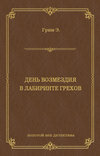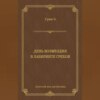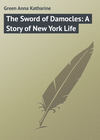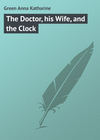Читать книгу: «Dark Hollow», страница 6
"Some anxiety was felt during the morning session that an adjournment would have to be called, owing to some slight signs of indisposition on the part of the presiding judge. But he rallied very speedily, and the proceedings continued without interruption."
"Ah!"
The exclamation escaped the lips of Deborah Scoville as she laid this clipping aside. "I remember his appearance well. He had the ghost of one of those attacks, the full force of which I was a witness to this morning. I am sure of this now, though nobody thought of it then. I happened to glance his way as I left the stand, and he was certainly for one minute without consciousness of himself or his surroundings. But it passed so quickly it drew little attention; not so, the attack of to-day. What a misfortune rests upon this man. Will they let him continue on the bench when his full condition is known?" These were her thoughts, as she recalled that day and compared it with the present.
There were other slips, which she read but which we may pass by. The fate of the prisoner was in the hands of a jury. The possibility suggested by the defence made no appeal to men who had the unfortunate prisoner under their eye at every stage of the proceedings. The shifty eye, the hang-dog look, outweighed the plea of his counsel and the call for strict impartiality from the bench. He was adjudged guilty of murder in the first degree, and sentence called for.
This was the end; and as she read these words, the horror which overwhelmed her was infinitely greater than when she heard them uttered in that fatal court room. For then she regarded him as guilty and deserving his fate and now she knew him to be innocent.
Well, well! too much dwelling on this point would only unfit her for what lay before her on the morrow. She would read no more. Sleep were a better preparation for her second interview with the judge than this reconsideration of facts already known to their last detail.
Alas, when her eyelids finally obeyed the dictates of her will, the first glimmering rays of dawn were beginning to scatter the gloom of her darkened chamber!
X
THE SHADOW
Bela was to be buried at four. As Judge Ostrander prepared to lock his gate behind the simple cortege which was destined to grow into a vast crowd before it reached the cemetery, he was stopped by the sergeant who whispered in his ear:
"I thought your honour might like to know that the woman—you know the one I mean without my naming her—has been amusing herself this morning in a very peculiar manner. She broke down some branches in the ravine,—small ones, of course,—and would give no account of herself when one of my men asked her what she was up to. It may mean nothing, but I thought you would like to know."
"Have you found out who she is?"
"No, sir. The man couldn't very well ask her to lift her veil, and at the tavern they have nothing to say about her."
"It's a small matter. I will see her myself to-day and find out what she wants of me. Meanwhile, remember that I leave this house and grounds absolutely to your protection for the next three hours. I shall be known to be absent, so that a more careful watch than ever is necessary. Not a man, boy or child is to climb the fence. I may rely on you?"
"You may, judge."
"On my return you can all go. I will guard my own property after to-day. You understand me, sergeant?"
"Perfectly, your honour."
This ended the colloquy.
Spencer's Folly, as the old ruin on the bluff was called in memory of the vanished magnificence which was once the talk of the county, presented a very different appearance to the eye in broad daylight from what it did at night with a low moon sending its mellow rays through the great gap made in its walls by that ancient stroke of lightning. Even the enkindling beams of the westering sun striking level through the forest failed to adorn its broken walls and battered foundations. To the judge, approaching it from the highway, it was as ugly a sight as the world contained. He hated its arid desolation and all the litter of blackened bricks blocking up the site of former feastings and reckless merriment, and, above all, the incongruous aspect of the one gable still standing undemolished, with the zigzag marks of vanished staircases outlined upon its mildewed walls. But, most of all, he shrank from a sight of the one corner still intact where the ghosts of dead memories lingered, making the whole place horrible to his eye and one to be shunned by all men. How long it had been shunned by him he realised when he noticed the increased decay of the walls and the growth of the verdure encompassing the abominable place!
The cemetery from which he had come looked less lonesome to his eyes and far less ominous; and, for a passing instant, as he contemplated the scene hideous with old memories and threatening new sorrows, he envied Bela his narrow bed and honourable rest.
A tall figure and an impressive presence are not without their disadvantages. This he felt as he left the highway and proceeded up the path which had once led through a double box hedge to the high, pillared entrance. He abhorred scandal and shrank with almost a woman's distaste from anything which savoured of the clandestine. Yet here he was about to meet on a spot open to the view of every passing vehicle, a woman who, if known to him, was a mystery to every one else. His expression showed the scorn with which he regarded his own compliance, yet he knew that no instinct of threatened dignity, no generous thought for her or selfish one for himself would turn him back from this interview till he had learned what she had to tell him and why she had so carefully exacted that he should hear her story in a spot overlooking the Hollow it would beseem them both to shun.
There had originally been in the days of Spencer's magnificence a lordly portico at the end of this approach, girt by pillars of extraordinary height. But no sign remained of pillar, or doorway—only a gap, as I have said. Towards this gap he stepped, feeling a strange reluctance in entering it. But he had no choice. He knew what he should see—No, he did not know what he should see, for when he finally stepped in, it was not an open view of the Hollow which met his eyes, but the purple-clad figure of Mrs. Averill with little Peggy at her side. He had not expected to see the child, and, standing as they were with their backs to him, they presented a picture which, for some reason to be found in the mysterious recesses of his disordered mind, was exceedingly repellent to him. Indeed, he was so stricken by it that he had actually made a move to withdraw, when the exigency of the occasion returned upon him in full force, and, with a smothered oath, he overcame his weakness and stepped firmly up into the ruins.
The noise he made should have caused Deborah's tall and graceful figure to turn. But the spell of her own thoughts was too great; and he would have found himself compelled to utter the first word, if the child, who had heard him plainly enough, had not dragged at the woman's hand and so woke her from her dream.
"Ah, Judge Ostrander," she exclaimed in a hasty but not ungraceful greeting, "you are very punctual. I was not looking for you yet." Then, as she noted the gloom under which he was labouring, she continued with real feeling, "Indeed, I appreciate this sacrifice you have made to my wishes. It was asking a great deal of you to come here; but I saw no other way of making my point clear. Come over here, Peggy, and build me a little house out of these stones. You don't mind the child, do you, judge? She may offer a diversion if our retreat is invaded."
The gesture of disavowal which he made was courteous but insincere. He did mind the child, but he could not explain why; besides he must overcome such folly.
"Now," she continued as she rejoined him on the place where he had taken his stand, "I will ask you to go back with me to the hour when John Scoville left the tavern on that fatal day. I am not now on oath, but I might as well be for any slip I shall make in the exact truth. I was making pies in the kitchen, when some one came running in to say that Reuther had strayed away from the front yard. She was about the age of the little one over there, and we never allowed her out alone for fear of her tumbling off the bluff. So I set down the pie I was just putting in the oven, and was about to run out after her when my husband called to me from the front, and said he would go. I didn't like his tone—it was sullen and impatient, but I knew he loved the child too well to see her suffer any danger, and so I settled back to work and was satisfied enough till the pies were all in. Then I got uneasy, and, hearing nothing of either of them, I started in this direction because they told me John had taken the other. And here I found her, sir, right in the heart of these ruins. She was playing with stones just as Peggy dear is doing now. Greatly relieved, I was taking her away when I thought I heard John calling. Stepping up to the edge just behind where you are standing, sir—yes, there, where you get such a broad outlook up and down the ravine, I glanced in the direction from which I had heard his call—Just wait a moment, sir; I want to know the exact time."
Stopping, she pulled out her watch and looked at it, while he, faltering up to the verge which she had pointed out, followed her movements with strange intensity as she went on to say in explanation of her act:
"The time is important, on account of a certain demonstration I am anxious to make. You will remember that I was expecting to see John, having heard his voice in the ravine. Now if you will lean a little forward and look where I am pointing, you will notice at the turn of the stream, a spot of ground more open than the rest. Please keep your eyes on that spot, for it was there I saw at this very hour twelve years ago the shadow of an approaching figure; and it is there you will presently see one similar, if the boy I have tried to interest in this experiment does not fail me. Now, now, sir! We should see his shadow before we see him. Oh, I hope the underbrush and trees have not grown up too thick! I tried to thin them out to-day. Are you watching, sir?"
He seemed to be, but she dared not turn to look. Both figures leaned, intent, and in another moment she had gripped his arm and clung there.
"Did you see?" she whispered, "Don't mind the boy; it's the shadow I wanted you to notice. Did you observe anything marked about it?"
She had drawn him back into the ruins. They were standing in that one secluded corner under the ruinous gable, and she was gazing up at him very earnestly. "Tell me, judge," she entreated as he made no effort to answer.
With a hurried moistening of his lips, he met her look and responded, with a slight emphasis:
"The boy held a stick. I should say that he was whittling it."
"Ah!" Her tone was triumphant. "That was what I told him to do. Did you see anything else?"
"No. I do not understand this experiment or what you hope from it."
"I will tell you. The shadow which I saw at a moment very like this, twelve years ago, showed a man whittling a stick and wearing a cap with a decided peak in front. My husband wore such a cap—the only one I knew of in town. What more did I need as proof that it was his shadow I saw?"
"And wasn't it?"
"Judge Ostrander, I never thought differently till after the trial—till after the earth closed over my poor husband's remains. That was why I could say nothing in his defence—why I did not believe him when he declared that he had left his stick behind him when he ran up the bluff after Reuther. The tree he pointed out as the one against which he had stood it, was far behind the place where I saw this advancing shadow. Even the oath he made to me of his innocence at the last interview we held in prison did not impress me at the time as truthful. But later, when it was all over, when the disgrace of his death and the necessity of seeking a home elsewhere drove me into selling the tavern and all its effects, I found something which changed my mind in this regard, and made me confident that I had done my husband a great injustice."
"You found? What do you mean by that? What could you have found?"
"His peaked cap lying in a corner of the garret. He had not worn it that day."
The judge stared. She repeated her statement, and with more emphasis:
"He had not worn it that day; for when he came back to be hustled off again by the crowd, he was without hat of any kind, and he never returned again to his home—you know that, judge. I had seen the shadow of some other man approaching Dark Hollow. WHOSE, I AM IN THIS TOWN NOW TO FIND OUT."
XI
"I WILL THINK ABOUT IT"
Judge Ostrander was a man of keen perception, quick to grasp an idea, quick to form an opinion. But his mind acted slowly to-night. Deborah Scoville wondered at the blankness of his gaze and the slow way in which he seemed to take in this astounding fact.
At last he found voice and with it gave some evidence of his usual acumen.
"Madam, a shadow is an uncertain foundation on which to build such an edifice as you plan. How do you know that the fact you mention was coincident with the crime? Mr. Etheridge's body was not found till after dark. A dozen men might have come down that path with or without sticks before he reached the bridge and fell a victim to the assault which laid him low."
"I thought the time was pretty clearly settled by the hour he left your house. The sun had not set when he turned your corner on his way home. So several people said who saw him. Besides—"
"Yes; there is a BESIDES. I'm sure of it."
"I saw the tall figure of a man, whom I afterwards made sure was Mr. Etheridge, coming down Factory Road on his way to the bridge when I turned about to get Reuther."
"All of which you suppressed at the trial."
"I was not questioned on this point, sir."
"Madam,"—he was standing very near to her now, hemming her as it were into that decaying corner—"I should have a very much higher opinion of your candour if you told me the whole story."
"I have, sir."
His hands rose, one to the right hand wall, the other to the left, and remained there with their palms resting heavily against the rotting plaster. She was more than ever hemmed in; but, though she felt a trifle frightened at his aspect which certainly was not usual, she faced him without shrinking and in very evident surprise.
"You went immediately home with the child after that glimpse you got of Mr. Etheridge?"
"Yes; I had no reason in the world to suppose that anything was going to happen in the ravine below us. Of course, I went straight on; there were things to be done at home, and—you don't believe me, sir."
His hands fell; an indefinable change had come over his aspect; he bowed and seemed about to utter an ironic apology. She felt puzzled and unconsciously she began to think. What was lacking in her statement? Something. Could she remember what? Something which he had expected; something which as presiding judge over John's trial he had been made aware of and now recalled to render her story futile. It couldn't be that one little thing—But yes, it might be. Nothing is little where a great crime is concerned. She smiled a dubious smile, then she said:
"It seems too slight a fact to mention, and, indeed, I had forgotten it till you pressed me, but after we had passed the gates and were well out on the highway, I found that Reuther had left her little pail behind her here, and we came back and got it. Did you mean that, sir?"
"I meant nothing; but I felt sure you had not told all you could about that fatal ten minutes. You came back. It is quite a walk from the road. The man whose shadow you saw must have reached the bridge by this time. What did you see then or—hear?"
"Nothing. Absolutely nothing, judge. I was intent on finding the baby's pail, and having found it I hurried back home all the faster."
"And tragedy was going on or was just completed, in plain sight from this gap!"
"I have no doubt, sir; and if I had looked, possibly John might have been saved."
The silence following this was broken by a crash and a little cry. Peggy's house had tumbled down.
The small incident was a relief. Both assumed more natural postures.
"So the shadow is your great and only point," remarked the judge.
"It is sufficient for me."
"Ah, perhaps."
"But not enough for the public?"
"Hardly."
"Not enough for you, either?"
"Madam, I have already told you that, in my opinion, John Scoville was a guilty man."
"And this fact, with which I have just acquainted you, has done nothing to alter this opinion?"
"I can only repeat what I have just said."
"Oh, Reuther! Oh, Oliver!"
"Do not speak my son's name. I am in no mood for it. The boy and girl are two and can never become one. I have other views for her—she is an innocent victim and she has my sympathy. You, too, madam, though I consider you as following a will-o'-the-wisp which will only lead you hopelessly astray."
"I shall not desist, Judge Ostrander."
"You are going to pursue this Jack-o'-Lanthorn?"
"I am determined to. If you deny me aid and advice, I shall seek another counsellor. John's name must be vindicated."
"Obstinacy, madam."
"No; conscience."
He gave her a look, turned and glanced down at the child piling stone on stone and whimpering just a little when they fell.
"Watch that baby for a while," he remarked, "and you will learn the lesson of most human endeavour. Madam, I have a proposition to make you. You cannot wish to remain at the inn, nor can you be long happy separated from your daughter. I have lost Bela. I do not know how, nor would I be willing, to replace him by another servant. I need a housekeeper; some one devoted to my interests and who will not ask me to change my habits too materially. Will you accept the position, if I add as an inducement my desire to have Reuther also as an inmate of my home? This does not mean that I countenance or in any way anticipate her union with my son. I do not; but any other advantages she may desire, she shall have. I will not be strict with her."
"Judge Ostrander!"
Deborah Scoville was never more taken aback in her life. The recluse opening his doors to two women! The man of mystery flinging aside the reticences of years to harbour an innocence which he refused to let weigh against the claims of a son he has seen fit to banish from his heart and home!
"You may take time to think of it," he continued, as he watched the confused emotions change from moment to moment the character of her mobile features. "I shall not have my affairs adjusted for such a change before a week. If you accept, I shall be very grateful. If you decline, I shall close up my two rear gates, and go into solitary seclusion. I can cook a meal if I have to."
And she saw that he would do it; saw and wondered still more.
"I shall have to write to Reuther," she murmured. "How soon do you want my decision?"
"In four days."
"I am too disturbed to thank you, judge. Should—should we have to keep the gates locked?"
"No. But you would have to keep out unwelcome intruders. And the rights of my library will have to be respected. In all other regards I should wish, under these new circumstances, to live as other people live. I have been very lonely these past twelve years."
"I will think about it."
"And you may make note of these two conditions: Oliver's name is not to be mentioned in my hearing, and you and Reuther are to be known by your real names."
"You would—"
"Yes, madam. No secrecy is to be maintained in future as to your identity or my reasons for desiring you in my house. I need a housekeeper and you please me. That you have a past to forget and Reuther a disappointment to overcome, gives additional point to the arrangement."
Her answer was:
"I cannot take back what I have said about my determined purpose." In repeating this, she looked up at him askance.
He smiled. She remembered that smile long after the interview was over and only its memory remained.
Покупайте книги и получайте бонусы в Литрес, Читай-городе и Буквоеде.
Участвовать в бонусной программе




















